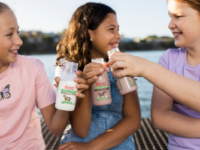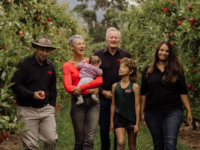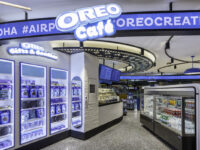
Australian consumers are in the privileged position of having access to a vast array of high quality seafood, but there’s a lack of awareness when it comes to choosing sustainable sourced fish. Marine Stewardship Council’s (MSC) 2018 GlobeScan Consumer Insights Report found that few Australian consumers are choosing to purchase eco-labelled fish and seafood products.
MSC’s blue fish tick label is displayed on products that meet the requirements of the MSC Fisheries Standard and helps prevent overfishing, as well as supporting livelihoods and food security.
Research by MSC found that about 30 per cent of seafood is mislabelled in international markets due to substitution and fraud. Anne Gabriel, MSC Oceania program director, said that stiff competition in the market has led some food manufacturers to take shortcuts and replace seafood with cheaper substitutes.
Mislabelling is costing the global fishing industry $33.8 billion a year and can result in consumers paying for and eating an altogether different species of fish, or worse, a fish with health warnings.
Supermarket giant Coles has bolstered its efforts to support sustainably sourced seafood. The retailer won the MSC Oceania Sustainable Seafood Supermarket of the Year Award for the third time in 2019 and Coles’ own brand was the first to receive MSC certification for its seafood deli counters.
James Whittaker, Coles’ head of responsible sourcing and quality, said that the grocery chain knows how important it is to support its customers in choosing sustainable seafood products and said that it is the retailer’s responsibility to urge the sector to set new standards in the industry.
Furthermore, seafood brands such as John West, Safcol Flavoured Salmon and Campbell’s have been honoured by the MSC for good sustainability practices.
Growing consumption
Vera Agostini, United Nations’ Food and Agriculture Organization (FAO) deputy director of fisheries and aquaculture, suspects climate change may negatively affect fisheries. The FAO said fish consumption is at record levels with 20.2 kg (44.5 lb) per person now compared to 9 kg in 1961.
So what does the future of the industry look like when consumption levels are becoming unsustainable?
BlueNalu is on a mission to be the global leader in cellular aquaculture. The company isolates the living cells from fish tissue without modifying genes and grows it into seafood products. Currently it is focusing on fin fish but it has plans to work on lobsters, crabs and mollusks in the future.
Meanwhile, US company Good Catch is exploring plant-based fish, to provide “seafood without sacrifice”. The company has recreated the texture and flavour of tuna by blending six legumes with algae oil. Industry innovation is happening and is set to spell big changes both for consumers in rich countries and in parts of the developing world.
Cell-based seafood

One innovative company is forging a path towards a truly original seafood alternative.
Shiok Meats is a Singapore-based start-up that’s created a world-first seafood product – cell-based crustaceans. Shiok Meats co-founders Dr Sandhya Sriram and Dr Ka Yi Ling started the innovative company in 2018 to create alternatives to prawns, crab and other crustaceans using stem cell technology.
“Early 2018, I made up my mind to start a cell-based meat company and started ideating on it; my good friend Ryan Bethencourt decided to put down the first cheque and that made me quit my job and start Shiok Meats. I wanted a co-founder and CTO; Ka Yi and I have known each other for many years and then she came on board,” Sriram told Inside FMCG.
Scientist and CEO of Wild Earth, Bethencourt, kicked off fundraising for Shiok Meats with his own investment in the business, and his networks soon followed. But it was the backing of the world’s largest accelerator, Y Combinator, that elevated Shiok Meats and helped it reach investment of $4.6 million to get started.
While cell-based food production may still be a baffling concept to many consumers, Sriram said the process is more ethical, sustainable and cruelty-free and produces an actual meat, with the same taste, texture and nutrition, rather than a fake meat.
While red meat and poultry producers receive a lot of backlash from consumers, there has been less negative focus on seafood. Sriram describes the seafood industry as “disgusting” and believes many consumers are unaware of the state of the industry.
“Currently, the seafood sector is more disgusting than the red and white meat sector. Shrimps are literally grown/farmed in sewage water or pig farm runoffs, then washed in bleach and antibiotics before being shipped off for consumption. Wild caught shrimps are loaded with microplastics and heavy metals and shrimp trawlers are so unsustainable,” she said.
“Cell-based seafood is the best alternative to the above – it still provides [the] same taste, texture and nutrition, but no animals are killed in the process.”
While Shiok Meats is still at the R&D stage, the team is hopeful that by the end of 2020 it will begin supplying a number of restaurants. So when can we expect to see cell-based seafood on supermarket shelves? For Shiok Meats, they are aiming to hit retail in the next five to seven years.













